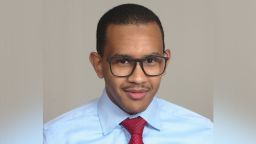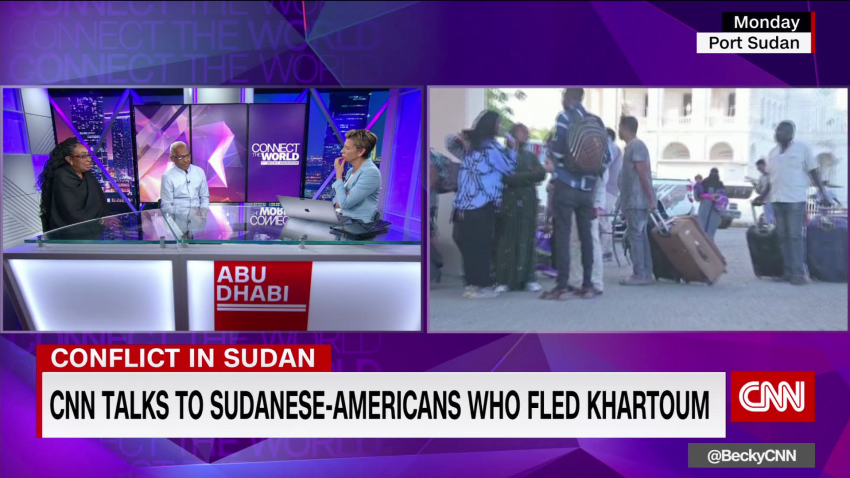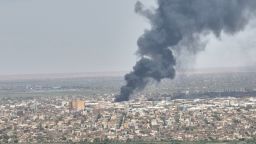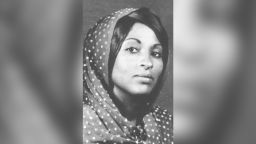Editor’s Note: Dr. Mohamed Eisa is the secretary-general of the Sudanese American Physicians Association and a gastroenterologist at the Allegheny Center for Digestive Health, Allegheny Health Network, in Pittsburgh, Pennsylvania. The views expressed in this commentary are his own. Read more opinion article on CNN.
I arrived in Sudan from my home in Pittsburgh on April 12 to bury my father, one day after he passed. At my mother’s house in Khartoum, friends and family kept us company, mourning with us and exchanging stories late into the night.
On April 14, in the final week of Ramadan, we gathered in our yard to break our fast when the sun set. A few hours later, we were jolted awake by a sound that shook the entire house.

It was nothing more than an accident, I thought. After all, my family lived on one of the busiest streets in a packed city. Accidents happen all the time.
But the explosions kept coming, one after another. I looked outside to try to make sense of the commotion, when I saw dozens of Sudanese Armed Forces (SAF) pickup trucks racing past us towards the airport, with dozens more belonging to their rivals, the Rapid Support Forces (RSF), in close pursuit. Only then did I realize that my family and I were trapped in the middle of a war zone in the heart of Khartoum.
Sudan had suffered for decades under the heavy hand of autocratic rule. In 2019, an uprising by the Sudanese people spurred the SAF and RSF to remove longtime dictator Omar al-Bashir from power.
At long last, there was a glimmer of hope for democracy in Sudan. Yet that, too, was snuffed out when the SAF and RSF toppled the civilian prime minister with whom they shared power as part of a purported transitionary phase toward democracy.
Ever since, the SAF and RSF have jointly ruled with continuous tensions between the two factions. Both groups continued to stall a new agreement that would revamp the process to put Sudan on the path to civilian rule.
As part of the final resolution being negotiated alongside Sudan’s political parties, it was decided that the RSF, which essentially operated independently as an armed militia, would fold into the army under the banner of the SAF. Eventually, those simmering hostilities erupted into an all-out conflict.
Once the bombs started falling on April 14, the next 10 days would mark the defining moments of my life. If my experience in Sudan is any indication, the US response to this catastrophe has been slow, haphazard and insufficient at every level. But it’s not too late to change course.
We lost electricity almost immediately, while the strikes became more and more ferocious. We learned to differentiate each terrifying sound of war: screaming fighter jets in the skies, attack helicopters buzzing overhead, sprays of automatic gunfire rippling through the neighborhood.
The RSF indiscriminately lobbed anti-aircraft missiles that crashed into homes and onto the streets. Every time I heard those earth-splitting explosions, I was convinced that our house was hit until proven otherwise.
We all huddled on our living room floor: My mom, my two brothers and two sisters, my aunt and uncle. Out of sheer necessity we would reassure each other, telling ourselves that somehow, some way, this would pass and we would be okay. But like clockwork, air fighters would resume their attacks at dawn, so we stayed put.
I looked for any distraction I could find, throwing myself into my work coordinating the Sudanese American Physician Association’s (SAPA) operations supporting health care facilities countrywide.
The field reports I received from my colleagues were harrowing: Hospitals bombed to rubble, ambulances dodging gunfire, mounting civilian deaths. One colleague tried to manually pump oxygen into a patient after the power was cut; tragically, 24 hours of frantic pumping wasn’t enough to save him.
The seventh day of fighting was the day I thought we were going to die. Gunfire and explosions roared all around us for 18 hours straight. My sisters cried all day. I frantically texted my wife back home in Pittsburgh, telling her everything I knew about our assets and accessing life insurance. US citizens that I know desperately tried to reach US embassy officials and received the same copy-and-paste response: We can’t help you now, shelter where you are.
Somehow, again, we made it through the night, and at a moment of relative calm, I found our front yard littered with dozens of bullet shells. I collected each one and hid them from my family; that was the last thing they needed to see. I decided then and there that the US was not coming to save us – it was time to flee Khartoum or die trying.
We called everyone we could think of to arrange transport in hopes of boarding a ship in Port Sudan. The one driver willing to take us insisted we meet him on the outskirts of the city. We scrambled to find a van, buckled up, and began driving for the longest 45 minutes of our entire lives.
For those 45 minutes traversing the city, I got the full picture of the destruction wrought by the warring sides, both content to burn Khartoum to the ground for the sake of power. The silence was haunting, a scene out of a horror movie: abandoned cars ablaze; scores of dead bodies rotting in the streets; RSF soldiers glaring and pointing their guns directly at us.
When we reached the bus driver, he told us to hide our identification cards – if the RSF discovered that I was a doctor, they would kidnap me and force me to treat their wounded. Over the course of the 11-hour journey to Port Sudan, we were stopped at gunpoint four times, with RSF soldiers threatening to shoot us if they found we belonged to their rival side. By the grace of God, we arrived intact.
US officials had assured us personally that we would be able to evacuate by ship. But one day passed, and then another, and then another. There were no American ships to be found. The humanitarian situation deteriorated by the day, with thousands of refugees flooding into the city. People were sleeping on the streets and collapsing from dehydration, with nowhere to turn for help.
Five days later my family and I managed to squeeze our way onto a ship arranged by the Royal Saudi Navy and Saudi embassy. I write this sitting safe and sound in Saudi Arabia. Even after all of that heartache and terror, I am one of the lucky ones.
As a resident of the United States, this entire experience has been confounding. Not once did US officials clearly communicate, provide useful guidance, or make any effort to protect us. While other countries seized on the first ceasefire to start evacuating citizens, the US initially rescued only embassy staff and diplomats.
Meanwhile, the entire health care sector in Sudan is on the brink of collapse. SAPA and our partners are doing everything we can to keep people alive, but we desperately need support. We are running out of medical supplies that make the difference between life and death – providing basic emergency kits would be but a drop in the bucket for the US.
On the diplomatic front, the US has significant leverage among the warring factions and Sudan’s neighboring countries. It’s time to use it. Egypt, one of the leading recipients of US foreign aid, is stranding an untold number of refugees on the border. Why would we tolerate such callous behavior from a so-called ally?
Then there is the matter of those still left languishing in Sudan. While US officials have in recent days stepped up efforts to evacuate those fleeing, there are still thousands of Americans waiting to be rescued. And their initial response left so many of us to fend for ourselves under the most horrific conditions.
When I encountered fellow US residents and Americans along my journey, we wondered aloud why the US government had abandoned us. The only explanation we could come up with is that even as patriotic Americans and health care workers – honest and hardworking taxpayers who give back to our communities – we are considered third-class citizens. I pray that the Biden administration will do everything in its power in the weeks and months to come to prove us wrong.






